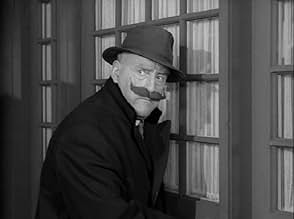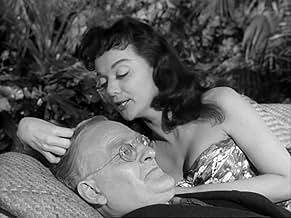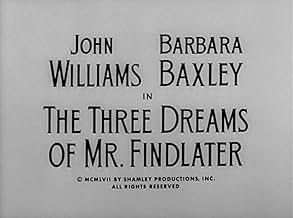Ernest Findlater is constantly nagged at by his wife so he fantasizes about Lalage, an exotic lover from the South Seas.Ernest Findlater is constantly nagged at by his wife so he fantasizes about Lalage, an exotic lover from the South Seas.Ernest Findlater is constantly nagged at by his wife so he fantasizes about Lalage, an exotic lover from the South Seas.
- Director
- Writers
- All cast & crew
- Production, box office & more at IMDbPro
Featured reviews
I keep trying to enlist the sarong-clad Lalage (Baxley) into my dreams but to no avail. But then poor businessman Findlater (Williams) probably needs her coy ministrations more than I do. What with his shrewish, ice-queen wife (Elsom), no wonder he retreats into a dream world whenever he can. Trouble is he can't seem to control the sarong temptress's comings and goings. So she keeps turning up at odd times, like hotel lobbies. Then too her half-clad posturings are about as seductive as 1950's TV gets. Anyhow, our dreamer keeps having a second unwilled fantasy where his wife dies a sudden, unproblematic death. But since that's not likely to happen, he and his dream girl embark on a murder scheme to escape the impossible wife.
It's tongue-in-cheek the whole way, with material more like The Twilight Zone than standard Hitch. It's also a slightly befuddled John Williams, unlike his usual authoritative roles. I'm not sure what the moral or lesson of the story is, unless it has to do with the power of wish-fulfillment. All in all, the story's a departure and likely a matter of audience taste.
It's tongue-in-cheek the whole way, with material more like The Twilight Zone than standard Hitch. It's also a slightly befuddled John Williams, unlike his usual authoritative roles. I'm not sure what the moral or lesson of the story is, unless it has to do with the power of wish-fulfillment. All in all, the story's a departure and likely a matter of audience taste.
The Three Dreams Of Mr. Findlater is a lesser Hitch half-hour. As it's adapted from an A.A. Milne story one can't but come to it in high hopes. Those hopes are dashed early on, even with the excellent cast and a potentially promising idea.
Where to begin? Maybe it's best to start by defining the word that best describes the episode: twee. The best dictionary definition I've ever read of that word, seldom used by Americans, fairly common in England, is "whimsy without wit".
The tale of a middle aged man of comfortable means but by no means affluent, and the persistence of his Walter Mitty daydreams of a South Seas woman he wants to run off with so as to ditch his stuffy, conservative wife, is too mundane to really build on.
I suppose we all daydream to one degree or another, and more so than we care to admit, however Mr. Findlater does more than that: he has invented a woman in his mind who's wholly a fantasy and who also talks with him, offers advice, and provides him with, well, not moral support; more like the immoral kind.
When Findlater and his Pacific isle princess begin to seriously plot to murder his wife the story falls apart, as it's reached a point where it's either going to rise into the realm of sophisticated comedy (Not So Blithe Spirit?), or turn into a study of a man descending into psychosis. It cannot, needless to say, be both.
The ending works: it's a modest and ironic save, but that's about it. John Williams puts much effort into the lead but he comes off as too authoritative for such a forlorn character. The rest of the cast is adequate; and in the case of Isobel Elsom as his unpleasant and at times surprisingly perceptive wife, far more than that.
Where to begin? Maybe it's best to start by defining the word that best describes the episode: twee. The best dictionary definition I've ever read of that word, seldom used by Americans, fairly common in England, is "whimsy without wit".
The tale of a middle aged man of comfortable means but by no means affluent, and the persistence of his Walter Mitty daydreams of a South Seas woman he wants to run off with so as to ditch his stuffy, conservative wife, is too mundane to really build on.
I suppose we all daydream to one degree or another, and more so than we care to admit, however Mr. Findlater does more than that: he has invented a woman in his mind who's wholly a fantasy and who also talks with him, offers advice, and provides him with, well, not moral support; more like the immoral kind.
When Findlater and his Pacific isle princess begin to seriously plot to murder his wife the story falls apart, as it's reached a point where it's either going to rise into the realm of sophisticated comedy (Not So Blithe Spirit?), or turn into a study of a man descending into psychosis. It cannot, needless to say, be both.
The ending works: it's a modest and ironic save, but that's about it. John Williams puts much effort into the lead but he comes off as too authoritative for such a forlorn character. The rest of the cast is adequate; and in the case of Isobel Elsom as his unpleasant and at times surprisingly perceptive wife, far more than that.
Straight out of the Walter Mitty textbook. We are led into the world of a dreamer who is constantly picked on by his verbally abusive and unappreciative wife. Women weren't treated very well in the fifties unless they were curvy sex objects. Well, there's one of those here too. The protagonist is stuck in his sense of morality. He would love to kill his wife and begin an adventurous life, but he would never do anything. In his reveries is a Tahitian treat. A Dorothy Lamour look alike who helps him make it from one day to the next by encouraging him to change his life. I found that I wasn't really attending much as this dragged on.
Bank manager Mr Findlater (John Williams) dreams of getting rid of his overbearing wife (Isobel Elston), aided by his dream woman Lalage (Barbara Baxley).
This episode is one of the more light-hearted ones. I always enjoy watching John Williams, but he really excels himself here - the way he expounds his second dream, doing all the voices, is brilliant. The whole episode is shown from his point of view, and he carries it wonderfully.
This isn't driven by atmosphere or suspense, but is great story telling. It's based on a story by A. A. Milne. I never liked Winnie the Pooh, but this makes me wonder if I should look at some of his other work.
Barbara Baxley is also good - both character-wise and physically - I wouldn't mind having her in my dreams...
Enjoy!
This episode is one of the more light-hearted ones. I always enjoy watching John Williams, but he really excels himself here - the way he expounds his second dream, doing all the voices, is brilliant. The whole episode is shown from his point of view, and he carries it wonderfully.
This isn't driven by atmosphere or suspense, but is great story telling. It's based on a story by A. A. Milne. I never liked Winnie the Pooh, but this makes me wonder if I should look at some of his other work.
Barbara Baxley is also good - both character-wise and physically - I wouldn't mind having her in my dreams...
Enjoy!
I have never liked this episode, not that funny, light hearted and a bit boring. I waited for the ending, to see how the husband would get - or ot - rid of his wife. I am not satisfied with this story, I guess it as nothing to do with this anthology series; It is amusing though, for elders in family. Not my favorite, I guess you have understood what I meant. But watch it, it is only twenty five minutes long.
Did you know
- TriviaThe story for this episode was written by A.A. Milne, the creator of Winnie the Pooh.
- GoofsDespite being set in The UK, the telephone in the club rings in the US way (one long ring instead of 2 short ones).
- Quotes
Self - Host: [afterword]
Psychiatrist in Introduction: [Hitchcock is snoring on the psychiatrist's couch. The psychiatrist looks exasperated. He leans in to look closely at Hitchcock, then turns to the camera with a shushing gesture] Shhh...
- SoundtracksFuneral March of a Marionette
Written by Charles Gounod
Details
- Runtime
- 30m
- Color
- Aspect ratio
- 1.33 : 1
Contribute to this page
Suggest an edit or add missing content













